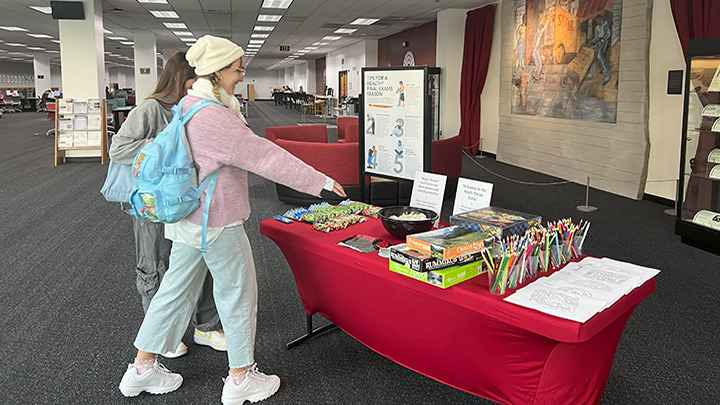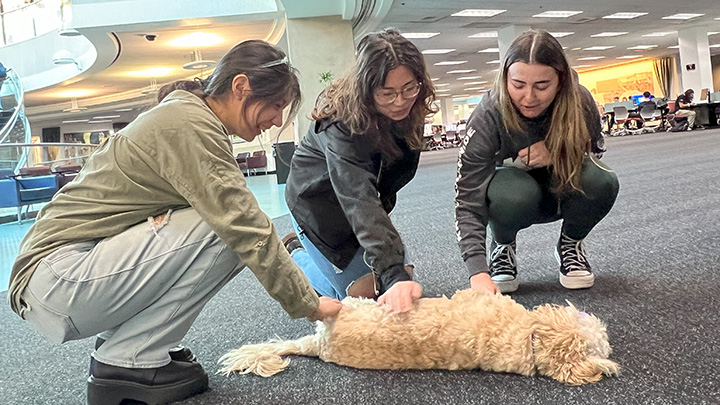Supporting Students Through Finals

December brings final exams for the fall semester, and the San Diego State University Library is prepared to help students succeed during one of the most challenging points of the semester.
The University Library partners with Associated Students each semester to add a Study Break Table for hard-working students. We supply snacks, small gifts, coloring pages and pencils, and games for a short break. Over the finals period, we will go through more than 1,500 granola bars and refresh the table at least four times daily!
Trinity Dang, Associated Student Vice President for University Affairs, said, “It is important that students care for themselves and their well-being, especially during finals. A.S. leaders are proud to collaborate with the SDSU Library by writing words of encouragement and positive affirmations to fellow students, serving as a reminder of support and inspiration for all who visit the Study Break Table.”
Aligning with the university’s emphasis on mental health and wellness, this semester’s theme is “10 Tips for Self-Care.” Students can build individual self-care kits at the Study Break Table. Health Sciences Librarian Cat Ellis researched ten tips for self-care, and these will be featured in a handy card, already in the gift bag, for students to reference. Along with these tips, the kits will include encouraging notes created by Associated Student officers.
The ten tips are:
- Spend time with your friends, family, partner, and/or pet. Loneliness is a known risk factor for mental health issues.1
- Move your body. Movement and exercise can relieve stress and improve physical health.
- Get enough sleep. Most adults need between 7 and 8 hours a night.2
- Eat well. Make sure to get enough calories and macronutrients (such as fiber). Remember to eat regularly.
- Go outside and “touch grass.” The internet’s right: nature is beneficial to mental and physical health.3
- Read. Reading for fun may help to relieve stress.4 Check out the SDSU Library’s collection (library.sdsu.edu) or one of our local public libraries.
- Drink water. Staying hydrated is important for both our physical and mental health.5
- Breathe. Take deep breaths when you feel stressed or overwhelmed.
- Do one of your hobbies. Taking a break from life by doing something you love can give you space from stressful situations.
- Take a break from caffeine. Caffeine can worsen anxiety in some people.6 Try herbal teas or aguas frescas for fun, caffeine-free alternatives.
Students will add to their bags from a selection of granola bars, herbal tea bags, earplugs, SDSU LIbrary stickers, bookmarks, and fidget toys. The bags will also have contact information for Student Health Services and Counseling and Psychological Services in case they have a greater need for help.
Since spending time with a pet (Tip #1) is impossible for students living on campus, we help with the next best thing – scheduled visits to the library by Luna, SDSU’s therapy dog. Her wagging tail, friendly nature, and enthusiastic ball-chasing always delight students. The faculty and staff at the library often sneak in a quick petting session too.

While students on campus enjoy the library’s hospitality, we hope you can use these tips to reduce stress in your life during this busy time of year.
Sources:
1 Staying connected to fight loneliness. (2020, May). NIH News in Health. https://newsinhealth.nih.gov/2020/05/staying-connected-fight-loneliness2 National Library of Medicine. (2017, May 5). Healthy Sleep. MedlinePlus. https://medlineplus.gov/healthysleep.html3 Jimenez, M. P., DeVille, N. V., Elliott, E. G., Schiff, J. E., Wilt, G. E., Hart, J. E., & James, P. (2021). Associations between nature exposure and health: A review of the evidence. International Journal of Environmental Research and Public Health, 18(9), 4790. https://doi.org/10.3390/ijerph180947904 Gualano, M. R., Bert, F., Martorana, M., Voglino, G., Andriolo, V., Thomas, R., Gramaglia, C., Zeppegno, P., & Siliquini, R. (2017). The long-term effects of bibliotherapy in depression treatment: Systematic review of randomized clinical trials. Clinical Psychology Review, 58, 49–58. https://doi.org/10.1016/j.cpr.2017.09.0065 Toivettula, A., Varis, O., Vahala, R., & Juvakoski, A. (2023, September 1). Making waves: Mental health impacts of inadequate drinking water services — From sidenote to research focus. Water Research, 243, 120335. https://doi.org/10.1016/j.watres.2023.120335
6 Klevebrant, L., & Frick, A. (2022). Effects of caffeine on anxiety and panic attacks in patients with panic disorder: A systematic review and meta-analysis. General Hospital Psychiatry, 74, 22–31. https://doi.org/10.1016/j.genhosppsych.2021.11.005

